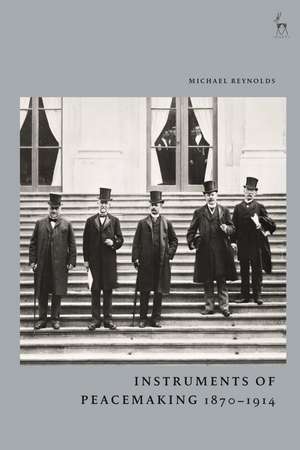Instruments of Peacemaking 1870-1914
Autor Michael Reynoldsen Limba Engleză Paperback – 25 ian 2023
| Toate formatele și edițiile | Preț | Express |
|---|---|---|
| Paperback (1) | 273.33 lei 6-8 săpt. | |
| Bloomsbury Publishing – 25 ian 2023 | 273.33 lei 6-8 săpt. | |
| Hardback (1) | 449.36 lei 3-5 săpt. | +34.72 lei 4-10 zile |
| Bloomsbury Publishing – 28 iul 2021 | 449.36 lei 3-5 săpt. | +34.72 lei 4-10 zile |
Preț: 273.33 lei
Preț vechi: 349.52 lei
-22% Nou
Puncte Express: 410
Preț estimativ în valută:
52.32€ • 53.91$ • 44.17£
52.32€ • 53.91$ • 44.17£
Carte tipărită la comandă
Livrare economică 04-18 martie
Preluare comenzi: 021 569.72.76
Specificații
ISBN-13: 9781509950096
ISBN-10: 1509950095
Pagini: 384
Dimensiuni: 156 x 234 x 25 mm
Greutate: 0.49 kg
Editura: Bloomsbury Publishing
Colecția Hart Publishing
Locul publicării:London, United Kingdom
ISBN-10: 1509950095
Pagini: 384
Dimensiuni: 156 x 234 x 25 mm
Greutate: 0.49 kg
Editura: Bloomsbury Publishing
Colecția Hart Publishing
Locul publicării:London, United Kingdom
Caracteristici
Focuses on Anglo-American disputes between 1870-1914 which laid the foundations for the promotion of international law through the Hague Convention
Notă biografică
Michael Reynolds is Visiting Senior Research Fellow in the Department of International History at the London School of Economics and Political Science, UK.
Cuprins
Introduction: A Utopian Dream? 1. Approaches to International Dispute Resolution I. Resolving Disputes between States: Influences on Policy Making II. The Nineteenth Century Approach III. Approach to Arbitration 2. The Geneva Arbitration I. The Anglo-American Relationship 1782-1861 II. How the Claims Arose III. The Diplomatic Negotiations Regarding the Treaty of Washington and the Tribunal's Terms of Reference,the Arguments of the Parties IV. The Claims V. Constitution of the Tribunal and the Proceedings VI. The Case of the United States VII. The Case of Britain VIII. Final Award of the Arbitrators IX. Sir Alexander Cockburn's Dissenting Award X. The Foreign Enlistment Act 1819 XI. Results of the Arbitration and Effect XII. Diplomatic Reflections on the American Civil War XIII. Lessons of the Geneva Arbitration 3. Forms of Dispute Resolution as Instruments of Prevention: Part I I. The Behring Sea Arbitration II. The Anglo-Venezuela Arbitration 4. Forms of Dispute Resolution as Instruments of Prevention: Part II I. The Pious Fund Case II. The Dogger Bank Inquiry III. The Panama Canal Dispute IV. The Casablanca Case 5. Towards a Code of International Arbitration: Instruments of Peace and Diplomacy I. Evolution of an International Law to Resolve Disputes between States II. Anglo-American Treaty Discussions III. The Influence of American Jurists IV. The Hague Conference and Convention 1899V. An International Court of Arbitration VI. The Inquiry Process VII. The Permanent Court of Arbitration VIII. Second Hague Peace Conference IX. Conclusions on the Hague Conferences 6. Diplomacy as an Instrument of Prevention I. The Anglo-American Arbitration Treaty II. Entente Diplomacy and the Moroccan Crises III. The Balkan Crisis 1912-13: Ambassadorial Consultations 7. When 'National Honour' Led to War I. The Utility of International Arbitration in the Context of the World Crisis of 1914 II. Sir Edward Grey III. The Diplomatic Counterpoise IV. Could a Dispute Process Have Stopped the Descent into War? V. Danger of Civil War in Ireland VI. The Predicament of Russia VII. The British Interest VIII. Russian Mobilisation IX. British Neutrality X. Decision for War XI. National Honour: The Diplomatic Counterfactual
